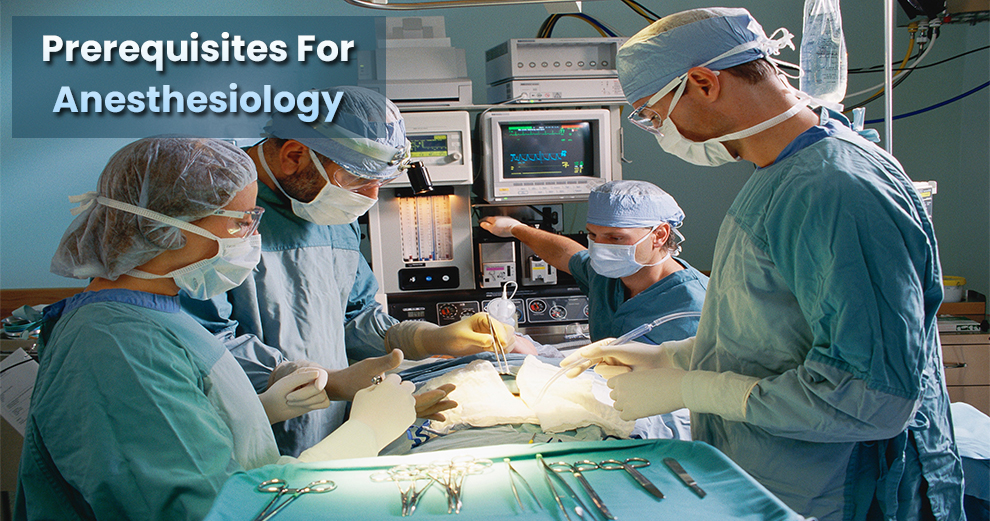Apart from basic Science (Biology, Chemistry) and Math (Algebra, Stats, Calculus), you must also have an understanding of Pharmacology, Anatomy & Physiology to be an Anesthesiologist
Anesthesiology demands many years of training and education. The role of Anesthesiologists is to manage pain via medications, particularly before, during, and after surgery. To be a successful anaesthesiologist, you should meet some Anesthesiologist prerequisites at different educational levels.
In high school, you must be well-versed in science with maths, calculus, algebra, and stats knowledge. Moving on to the undergrad courses, you must take up Pharmacology, Anatomy & Physiology classes. Further in the pre-med education, you must be well versed with subjects like Biology, Chemistry, Biochem, Medical law and Ethics, to name a few.
In this guide, we will study all these requirements and even discuss the roles and responsibilities of anesthesiologists.
Let us get to them one by one.
Prerequisites For Anesthesiology You Must Meet
Here are some courses that form the essential background for anesthesiology:
A. In high school
The American Society of Anesthesiologists suggests that a student’s preparation must begin at the high school level. Typically, college and university study concentrates on classes in pre-med. Hence, ASA recommends getting a headstart and focusing on the sciences from the school level itself.
For this, there are some prerequisites you must take note of. You can start with Chemistry and Biology courses to build the foundational level knowledge needed to excel in the university-level classes and give you a kickstart into becoming an anesthesiologist.
Here are some courses you can consider taking at the high school level.
1. Math and Stats
Typically, anesthesiologists working in an OR do not need anything more than elementary mathematical skills acquired at elementary school. However, to read and comprehend the research work, you should know the fundamentals of basic statistics. Whatever you learn at high school suffices as the pre reqs for anesthesiologists.
But, if you get into academics, you must have better mathematics skills. However, an average working anesthesiologist should be capable of assessing milligrams per kilo or micrograms per kilo, which is about as tricky as it gets most of the time. It is something you do orally as a routine affair.
However, to become an anesthesiologist, you should go to college and clear some gateway courses. One such course is freshman calculus. In addition, you can also consider taking a statistics class in. college. These two courses are all the math training you need as prerequisites suffice for you to clear the MCATs, a standardized test by the medical school for admission. Further, your stats knowledge in med school will help to perform well in different tests you will take in the four years.
After you become a resident, you will perform anesthetics on patients. So, then, the only math you will require is Algebra. You use it to calculate the dosages for different meds you need to anesthetize your patients.
Once you graduate from residency, you will apply statistics to understand the papers you read in med journals. Unless you become a research anesthesiologist, you will rarely use the calculus you learned in college.
B. In Undergrad school
Whatever you pick, a B.S or a B.A degree, some prerequisites for anesthesiology are quintessential. So, you should take courses on:
1. Human anatomy and Physiology
As a specialized practicing anesthesiologist, you do not employ a lot of anatomy in your work. Typically, it is the radiologists and surgeons who will need more basic anatomy understanding than you. They have to employ that knowledge on an everyday basis.
Even though American med schools do not have specific requirements for anatomy and physiology classes before starting school, it always helps to have some rudimentary knowledge before you walk on the path of becoming an anesthesiologist.
Only if you enjoy human anatomy could you excel as an anesthesiologist. It is even when your work is not heavily dependent on anatomy understanding. Why?
As an anesthesiologist, you employ medications to manipulate normal human physiology. Hence, you must know how the body and the medication work to achieve the required outcome. You will also use anatomy knowledge to perform the processes safely and effectively. It can also help you understand what the surgeons are doing. So you can tailor the anesthetic to the procedure.
2. Pharmacology
Pharmacology is the study of drugs and their impact on the human body. As an anesthesiologist, drugs will form a part of your everyday work. Hence, it is one of the crucial anesthesiologist prerequisites and is critical for you to study pharmacology in pre-med school.
C. In pre-med school
Beyond the studies in the B.S. program, you can also do more intensive training toward your medical studies by opting for a pre-med course at a college or university. Following the investigations by the American Society of Anesthesiologists, most accredited universities or colleges in America have pre-med classes.
But, the association particularly recommends taking courses in organic chemistry, physics, biology, general chemistry, and calculus. The undergrad major does not have to be related 100% to medicine. So, if you take these courses, you can easily manage.
1. Biology
Under biology, you learn about plants and animal organisms, their cells, tissues, functions, interactions, and interdependencies on each other and with the environment. General anesthesia is a crucial aspect of clinical care in humans. However, the anesthetized state has implications for biology.
The drugs work on organisms ranging from primates to plants and paramecia. Even though unconsciousness is primarily a cardinal feature of general anesthesia, its endpoint applies to a particular subset of organisms susceptible to anesthesia.
So, your understanding of biology proves instrumental in becoming an anesthesiologist. Hence, it is one of the primary prerequisites for anesthesiology.
2. Chemistry
An anesthesiologist should possess an excellent understanding of organic and general chemistry. It is beneficial because it helps one know how drugs work and making changes can influence their impact. In addition, other chemistry concepts, too, fall under the prerequistes. You should know:
- How different monitors work
- Why do some adjustments in machine parameters like gas flow rates have a specific impact
- Why anesthesia machines are constructed the way they are, and
- Numerous other concepts related to taking care of anesthetized patients
3. Biochemistry
An anesthesiologist must know what happens to the patient during anesthesia or those under intensive care. It is what biochemistry will teach you. Some pre reqs for anesthesiologists in biochem include topics such as:
- Blood-Brain Barrier
- Cerebral Edema
- The Acid-Base equilibrium
- Perineural adjuvants
- The Pulmonary surfactant
- Theories of Narcosis
- Local anesthetics
- Shock
- Normobaric Oxygen Therapy
In addition, knowledge of hyperventilation effects and their outcome is also pivotal.
4. Medical ethics and law
As a practicing anesthesiologist, there will be some legal bindings and medical ethics you need to adhere to. Hence, their knowledge is crucial.
What Does An Anesthesiologist Do?
Anesthesiologists have a crucial role to play before, during, and after a surgical procedure. We now have a fair understanding of anesthesiologist prerequisites. So, let’s take a look at the responsibilities of an anesthesiologist.
A. Before Surgery
Before every surgery, an anesthesiologist works with the patient to ensure they can endure anesthesia. They will scan through the patient’s medical history and answer all questions of the family and the patient concerning the medical procedure. Once that happens, they will administer anesthesia before the surgery and check on the patient’s vitals.
B. During Surgery
An anesthesiologist does not perform the surgery, but they stand beside the surgeon to monitor vitals and manage pain across the procedure. Further, across the surgery, they will also help with any chronic condition that the patient might have, such as diabetes and asthma. Moreover, if any issue crops during the medical procedure, the anesthesiologist will be on top of its management too. The pre reqs for anesthesiologists like pharmacology and anatomy become of great help here.
C. After Surgery
After the surgery ceases, the anesthesiologist will closely monitor the patient’s recovery from the effect of anesthesia. They will also have a say in the patient’s discharge. If anesthesia is administered, the anesthesiologist works with surgeons on taking a call on whether the patient must be moved within the hospital or allowed to go home. Further, they will also assist in creating a patient pain management plan post-discharge.
Typically, most anesthesiologists work in a surgical setting. However, some decide to specialize in the management and treatment of chronic pain. In such cases, the specialist will treat patients with migraines, fibromyalgia, or any other chronic illness that might regularly inflict pain.
What Is The Difference Between An Anesthesiologist and An Assistant Anesthesiologist?
An anesthesiologist or a CRNA is an advanced practice registered nurse who offers post-surgical care and keeps a check on the vitals. Some states let the CRNA administer anesthesia independently without supervision. But, in others, they work with an anesthesia care team comprising anesthesiologists and some other practitioners.
On the contrary, a certified anesthesiologist assistant (CAA) is a highly-skilled professional. They offer anesthetic care and work under the supervision of a licensed anesthesiologist. They employ specific tools to monitor anesthesia and its impact on the patients.
Their other scope of work involves offering general supportive measures, which let the primary anesthesiologist function better. The national organization for CAAs is the American Academy of Anesthesiologist Assistants (AAAA), and the national organization for CRNAs is the American Association of Nurse Anesthesiology (AANA).
Nonetheless, Both CRNA and anesthesiologist assistants are highly skilled and trained healthcare professionals. So now let us discuss the differences between the two based on different factors including the anesthesiologist prerequisites:
A. Job Outlook
Studies by the U.S. Bureau of Labor Statistics state that with the aging population, both these career paths are likely to see growth. It is also because the healthcare field now opts for a team approach to patient care.
B. Scope of practice
CRNAs can work anywhere in America. They either practice under the upkeep of a physician, within the anesthesia care team, or have an independent practice sans supervision in opt-out states.
On the contrary, CAAs can solely work within the anesthesia care team model. They cannot practice anywhere in the country. But as per the rule passed in July 2022, the CAAs have practice rights and licensure in twenty jurisdictions.
CRNAs and CAAs maintain, prepare, and test anesthesia equipment before and after the surgery. They also extend support to the anesthesia care team during procedures to ensure the patient receives the best medical care with minimum risk.
C. Salary
Wages and salaries for both positions can vary as per the medical facility, location, education, demand, and experience. CRNAs and CAAs can also earn overtime, amplifying their overall income.
On average, CRNA earns – $147,801 per annum.
On average, CAA earns – $122,787 per annum.
D. Education – Prerequisites for anesthesiology
CRNAs and CAA are both advanced medical professionals and require graduate degrees.
To be a successful CAA, you will first need a bachelor’s & a master’s degree from a school that provides an accredited anesthesiologist assistant program.
On the other hand, CRNA(s) are registered nurses. You must have a Bachelor of Science in Nursing or an Associate’s Degree alike. After you become a registered nurse, you can get a doctoral degree or complete a master’s to work as a CRNA.
E. Certification
You will have to clear the national certification exam for CAA and CRNA. Then you must maintain the certification by taking the recertification exam and enrolling in continuing education courses. CAAs take the NCCAA exam, and CRNAs take the NBCRNA exam.
Since the CRNAs follow the NBCRNA’s CPC program, they will have to renew their credentials every four years. So, you will have to complete 100 class credits and four core models across the eight-year cycle. After four years, you will appear for the CPC assessment.
CAAs submit the fifty continuing medical education hours every two years. In addition, they sit for the Continued Demonstration of Qualifications Exam every six years.





